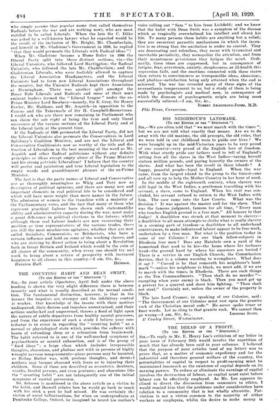THE COUNTING HABIT AND DEAN SWIFT. [To THE EDITOR OF
THE " SPECTATOR."] Sia,—In your article (Spectator, April 3rd) under the above beading is shown the very slight difference there is between insanity and what is usually described as the normal condi- tion. The fundamental distinction, however, is that in the former the impulses are stronger and the inhibitory control is weaker. Our knowledge of the insane with their motives undisguised, their desires and inmulses unrestrained, and their actions unchecked and ungoverned, throws a flood of light upon the nature of subtle departures from healthy mental processes, and from the experience of such a study I believe your con- tributor is in error in regarding the " counting habit " as a normal or physiological state which provides the sufferer with hours of refreshing sleep or a relaxation from brain-work. The habit referred to is one of the well-marked symptoms of psycliosthenia or mental exhaustion, and is of the group of "fixed ideas": a large class which includes irrepressible thoughts, obsessions, and phobias met with in persons of highly wrought nervous temperaments—pious persons may be haunted, as Bishop Butler was, with profane thoughts, and devote.l mothers may become obsessed with fears as to injuring their children. Some of these are described as eccentrics, doubters, cranks, fearful persons, and even geniuses; and obsessions like the " counting habit " are not infrequently one of the initial symptoms of mental perversion.
Dr. Johnson is mentioned in the above article as a victim to the habit, and Boswell relates how he would go back to touch with his stick a post he had missed. He was certainly the victim of aural hallucinations, for when an undergraduate at Pembroke College, Oxford, be imagined he heard his mother's voice calling out "Sam " to him from Lichfield; and we know that the habit with Dean Swift was a symptom of the disease which so tragically overwhelmed his intellect and closed his life. To many persons these habits are anything but a relief; they are recurrent parasitic mechanisms in which the incen- tive is so strong that the excitation is under no control. They are dominating and relentless, they recur with tyrannical and inevitable periodicity, they monopolize the attention, and from their monotonous persistence they fatigue the mind. Ordi- narily, these ideas are suppressed, but in consequence of fatigue, fear, overstrain, anxiety, sleeplessness, or ill-health this repression fails, and the emotions connected with these states then return to consciousness as irresponsible ideas, obsessions,- and phobias—satisfaction being only attained when the end is achieved. The war has revealed many of these signs of the neurasthenic temperament to us, but a study of them is being made by psychologists and medical men, in consequence of which the diseases of psycho-genetic origin are being most successfully relieved.—I am, Sir, &c., Phis Dines, Carnarron.
ROBERT ARMSTRONG-JONES, M.D.


































 Previous page
Previous page